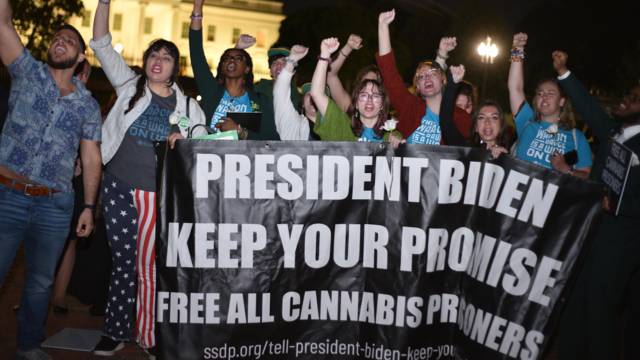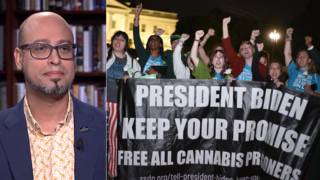
By Amy Goodman & Denis Moynihan
“Today, I signed a pardon for my son Hunter,” President Joe Biden said in a statement released by The White House on December 1st. “I hope Americans will understand why a father and a President would come to this decision.” Hunter Biden awaited sentencing for two federal criminal convictions, for lying about his drug addiction on a gun purchase form and for tax evasion. He most likely would have spent less than five years behind bars. Joe Biden correctly labeled the prosecutions as partisan and politically motivated. “Hunter was singled out only because he is my son,” Biden said. With the simple stroke of a pen, President Biden saved his son from a terrible ordeal. Before he leaves office, he should extend the same compassion to thousands of people in federal prison, victims of the so-called war on drugs.
“This is definitely an opening for folks to talk about exactly how expansive we can use the pardon power of the president to make sure that we’re correcting the injustices that were done over the past 20 or 30 years when it comes to cannabis crimes,” Jason Ortiz, director of strategic initiatives at the Last Prisoner Project, said on the Democracy Now! news hour. “President Biden himself was actually one of the architects of the 1994 crime bill that created a lot of the outrageous sentences that we’re now dealing with today.”
Ortiz was referring to the Violent Crime Control and Law Enforcement Act of 1994, which Biden championed as a senator, and which accelerated mass incarceration. Udi Ofer, former Director of the ACLU’s Justice Division, wrote in 2019, on the crime bill’s 25th anniversary, “Under the leadership of Bill Clinton, Democrats wanted to wrest control of crime issues from Republicans, so the two parties began a bidding war to increase penalties for crime, trying to outdo one another.”
Democrats have largely accepted the failure of the 1994 crime bill. In 2015, former President Bill Clinton admitted, “The problem is, the way it was written and implemented, we cast too wide a net. We have too many people in prison.” While campaigning for president in 2019 and 2020, though, Joe Biden repeatedly denied that the law he helped write contributed to mass incarceration.
Jason Ortiz continued, “There are over 3,000 federal cannabis prisoners currently incarcerated [who] also have families and have parents and loved ones…So, while I can understand why the president wants to have compassion for his own son, we’re really frustrated that he’s refusing to extend that compassion to all the parents currently watching their kids waste away in prison.”
On October 6, 2022, President Biden issued a blanket pardon for those convicted federally for simple marijuana possession. The Justice Department explained then, however, that “conspiracy, distribution, and possession with intent to distribute are not pardoned by the proclamation.”
The goal of The Last Prisoner Project is to expand the relief from the drug war’s draconian sentences to those convicted of distribution and other charges.
“Right now, we have folks serving decades for trafficking,” Ortiz said, “exactly what the hundreds of legal cannabis businesses across the country are currently doing on a regular basis, including in Washington, D.C. We’re seeing people sitting in prison for decades for the same activity that is currently generating tax revenue for cities and states across the country. We’re paying for schools and building bridges with cannabis dollars, but still letting folks waste away in prison.”
The Last Prisoner Project is not alone in calling for clemency. Last month, as President Biden prepared to pardon turkeys as part of an annual Thanksgiving photo op, more than fifty members of Congress sent a letter urging Biden to use the pardon power to address the ongoing crisis of mass incarceration.
“The United States represents just 5% of the world’s population, yet we hold more than 20% of the global prison population,” progressive Minnesota Congressmember Ilhan Omar said at a news conference announcing the letter. “Over 1.9 million individuals are currently incarcerated with a disproportionate impact on communities of color. Black men are incarcerated at more than five times the rate of white men, a legacy of systematic inequalities that have persisted for generations…President, Biden has a real opportunity to make a difference in these final days of his term, we are calling on him to act.”
Hunter Biden will very likely never see the inside of a prison cell, nor experience the discrimination and indignities imposed on former felons. President Biden has the power to pardon thousands of people imprisoned for federal cannabis crimes, or commute their sentences to time served and allow them to return home. The power is in his hands, but he still needs to be pushed by the millions of citizens in whose name he wields it.











Media Options